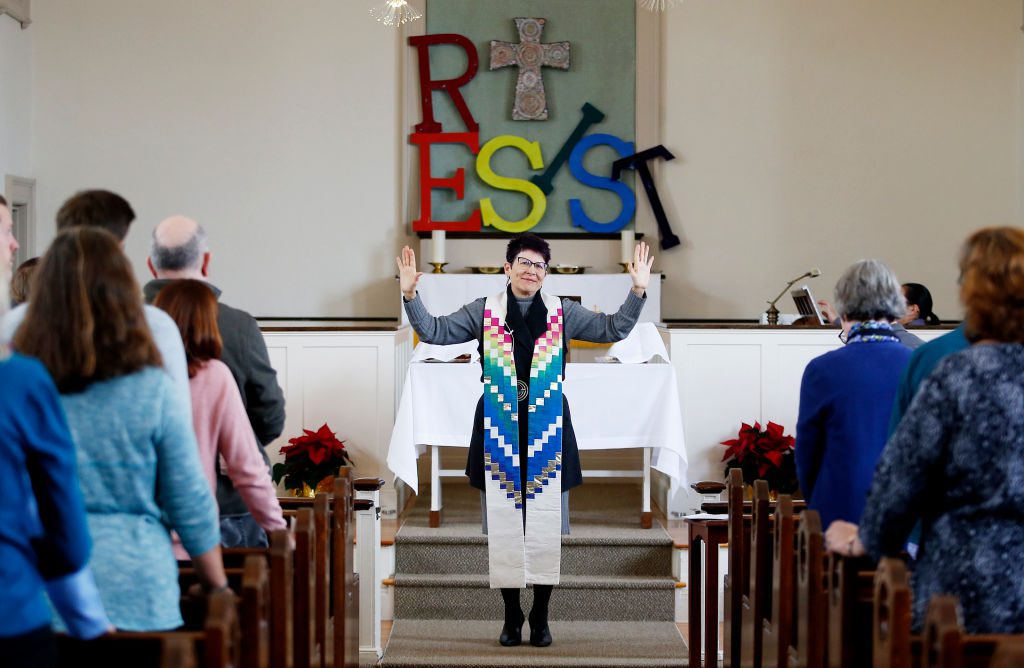The Methodist Split: Who Proposed It and Who Should Bear the Burden

The announcement at the start of this year was dramatic. Liberal and conservative leaders within the United Methodist Church had agreed to split the denomination in two over the issue of same-sex marriage. Their proposal, which would enforce the agreement on the whole church internationally, will be presented to the worldwide General Council in May
Reporting in the New York Times and Washington Post emphasized that global approval was expected because of the broad ideological and international character of the 16-member committee that drafted the proposal. Its members represented the U.S., Europe, Asia, and Africa.
The proposal would spin off a “Traditionalist Methodist” denomination that would retain the present Book of Discipline provisions opposing same-sex marriages and ordained ministers actively practicing homosexuality or officiating at such unions, on the grounds that these are against Christian teaching. (It would not change the provision supporting lesbians and gays as “members and friends.”)
Meanwhile, parishes wishing to eliminate current Discipline restrictions on same-sex marriages would remain in the present church where those prohibitions would be removed. Conservatives could join the new traditionalist denomination after winning a majority vote from their local congregations, and then would only be able to take some assets with them, perhaps not even including their buildings.
Curiously, the news stories did not report the precise composition of the committee recommending the changes, that in fact while there were 12 Americans and one European, there were only two Asians and one African. The Post did note that the Americans had been “stunned” last year when they proposed two liberalizing marriage plans to a conference, expecting to prevail on at least one, but failed on both. Indeed, led by Africans and Asians, the conference adopted a Traditional Plan that continued opposition to LGBT church marriages and even increased penalties on ministers who conduct them.
The new proposal would thus strangely require that the last conference’s conservative majority parishes bear the burden of splitting from the present organization. Given that the five million Africans and Asians are mostly conservative, and that the Pew Research Center reports that even a majority of the six million American Methodists are conservative, one might have thought that the recent progressive “compromise” would run into another stunning defeat. It at least might have placed the burden of leaving the church on the progressives who are demanding the reversal of long-held dogma.
How do such things happen? In the U.S., the Methodist leadership is made up disproportionately of the 15 percent minority of its members that Pew reports call themselves “liberal.”
That the majority are led by an intellectual elite is nothing new in the modern religion business. Back at the end of the historic Catholic Church Vatican Council in the early 1960s, the great sociologist Talcott Parsons apologized for predicting beforehand that the traditionalist bishops would dominate the conference and minimize change. Given the large changes that ended up being made, he was forced to admit that with modern mass communication, the elites in the universities and media had held the dominant hand.
The same dynamic holds for Methodists—indeed for all religions to some degree and especially in the West. This is because those religions’ intellectual elites tend to support progressive reforms that their ordinary members tend to oppose, even to think heretical. This explains to a large degree why denominations led by these intellectuals have suffered from declining membership. In the U.S., all the mainline Protestant denominations have declined to less than 15 percent of the population, with the more conservative Methodists the largest one at 3.5 percent of the population. As far as other denominations go, the relatively traditionalist Catholics are the largest at 20 percent, and if you combine them with self-identified evangelicals, religious conservatives represent about 25 percent of the population. Throw in Mormons and Orthodox, and you have a majority of Americans.
Traditionalist thinking contains a presumption against intellectual fashions changing longstanding moral principles when the consequences of change are thought unknown or harmful. Certainly some traditions need change, but the burden should be placed on those who propose to move away from long-tested moral codes. That’s especially the case within private institutions like religions and even more so if the majority oppose changing existing principles.
One of the Methodist Book of Discipline‘s principles is that “all persons are of sacred worth” “without regard for race, color, national origin, status or economic condition.” Should those who propose to jettison this be able to force those who wish to retain it to bear the burdens of leaving the church?
And that is where the United Methodist split may be seen as positive, if done with proper respect for the status quo. Let the two organizations freely contest for members. American church affiliation statistics suggest the odds would favor the traditionalists but a religious membership market would ultimately decide.
Donald Devine is senior scholar at the Fund for American Studies. He is the author of America’s Way Back: Reclaiming Freedom, Tradition, and Constitution and Reagan’s Terrible Swift Sword: Reforming and Controlling the Federal Bureaucracy. He served as President Reagan’s director of the U.S. Office of Personnel Management. He can be followed on Twitter @donalddevineco1
Comments